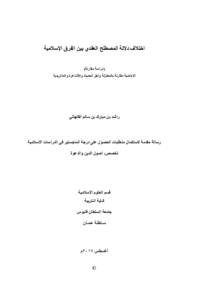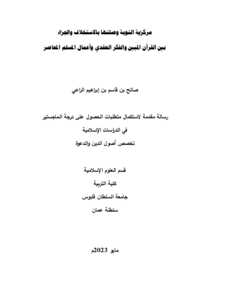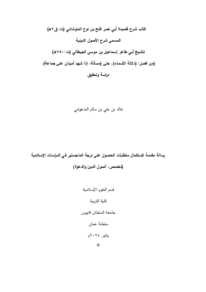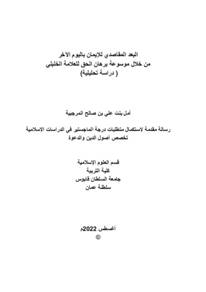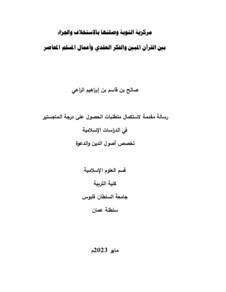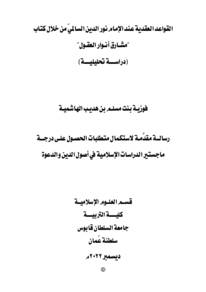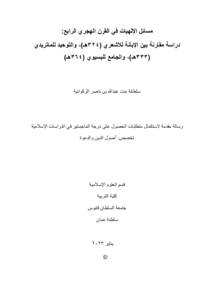Document
اختلاف دلالة المصطلح العقدي بين الفرق الإسلامية : دراسة مقارنة : الإباضية مقارنة بالمعتزلة و أهل الحديث و الأشاعرة و الماتريدية.
Identifier
القلهاتي, راشد بن مبارك بن سالم (2017).اختلاف دلالة المصطلح العقدي بين الفرق الإسلامية : دراسة مقارنة : الإباضية مقارنة بالمعتزلة و أهل الحديث و الأشاعرة و الماتريدية (رسالة ماجستير، جامعة السلطان قابوس،مسقط، عمان).
Publisher
جامعة السلطان قابوس.
Gregorian
2017
Language
Arabic
English abstract
This study, entitled "The Difference of 'aqidah related Terminology among Islamic Groups" is a comparative study which aims at searching for the significant differences of the terminological meanings related to 'aqidah questions. This is carried out through searching and investigating the definitions or significance of some of these terminologies embraced by the following Islamic groups: (Ibādiyyah, Mu'tazilah, Ash'ariyyah, Mātūrīdiyyah and Ahl alHadīth). The study attempts to compare between the technical expressions, their meanings as well as the similarities and differences between these terminologies. The aim is to mention the commonalities as well as differences between these technical terms according to the methodology used, if specific to one group, and to clarify on the possibility to harmonise them with the terms used by the other groups through a reevaluation.
This study includes an introduction, a preliminary chapter, four main chapters and a conclusion. The introduction represents the summary of the research plan which includes the research problem, its dimensions, its significance, its objectives and its plan. The preliminary chapter covers the discussion of the 'aqidah related terminology, its origins, then its development and the reasons that led to the respective differences
Chapter one includes three subchapters, all of which focus on searching the terminologies pertinent with divinities (iāhiyāt) beginning with the monotheism (tawhīd) terminology in the first theme. The study then relies on the meaning of monotheism, to define the divine self (al-dhät) and the divine attributes (al-şitāt) in the second theme. The third subchapter covers the divine attributes and their relation to the creation of the Holy Qur'an.
The second chapter includes two themes. The first subchapter discusses terminologies pertinent to prophethood, such as prophet, messenger, Quran, miracle and revelation. The second subchapter then sheds light on the terminologies associated with humankind such as fate, destiny and most importantly the question of whether people's actions are created and its relationship with acquirement and ability.
Chapter three discusses the issues of names and judgments (al-asma' wa 1ahkām) in two themes. The first subchapter, as the most important one, discusses the terminologies of belief and disbelief and their impact on names and worldly judgments, among which are the judgments of loyalty and innocence (al-walāyah wa l-barā'ah) already discussed in chapter two. Subchapter two concludes by the singularity of the Ibädiyyah in developing loyalty and innocence from the pure linguistic to terminological use in a clear and detailed meaning.
Chapter four is allocated to discuss the issues of promise and threat (alwad wa l-wa'id), in three themes. The first subchapter is about the day of judgment, the scale and the straight path whereas the second is about intercession. The third subchapter discusses the term eternity in an attempt to link the impact of these terms with the names and judgments in the previous chapter, as they are closely linked with the topic of promise and threat.
The study concludes with some findings and recommendations such as the significance of the Ibādiyyah in determining the meanings of terminologies pertinent with divinities, names and judgments which are characterized as stable, significant and clear. As for the terminologies associated with prophethood, promise and threat, the difference was not in the terminology itself but in the requirements of the terminology, its generalization or specification. Almost all groups agreed on the terms used for prophethood and humankind except for the question of fate and destiny, where the Mu'tazilah took a different stance in originating the respective expressions.
Member of
Resource URL
Arabic abstract
إن هذه الدراسة بعنوان " اختلاف دلالة المصطلح العقدي بين الفرق الإسلامية" دراسة مقارنة للبحث عن الفروق الدلالية لمعاني المصطلح العقدي، من خلال بحث واستقصاء تعريف أو مدلول بعض هذه المصطلحات عند بعض متکلمي الفرق الإسلامية الأتية: (الإباضية والمعتزلة والأشعرية والماتريدية وأهل الحديث)، ومحاولة المقارنة بين ألفاظ مصطلحاتهم ومعانيها أو مفهومها، بهدف ذكر أوجه الشبه أو الاختلاف بين هذه المصطلحات أو بيان التشارك اللفظي بين ألفاظها أو تعليلها حسب منهج أصحابها إن كانت متفردة، وموضحة إمكانية التوفيق والجمع بينها من خلال إعادة تحريرها
وقد اشتملت هذه الدراسة على مقدمة ومبحث تمهيدي وأربعة فصول وخاتمة، أما المقدمة فكانت لعرض ملخص خطة البحث التي تضمنت مشكلة البحث وحدوده وأهميته وأهدافه وخطته، وأما المبحث التمهيدي فقد خصص لمناقشة تعريف المصطلح العقدي ونشأته ثم مراحل تطوره والأسباب التي أدت إلى الاختلاف
أما الفصل الأول من الدراسة فقد اشتمل على ثلاثة مباحث؛ خصصت كلها للبحث عن المصطلحات المتعلقة بالإلهيات بداية من مصطلح الجملة أو التوحيد ثم اعتمدت الدراسة على مدلول التوحيد التعريف مصطلح الذات والصفات في المبحث الثاني، ثم تعريف صفة الكلام وعلاقة مسألة خلق القرآن بها في المبحث الثالث، أما الفصل الثاني فقد تضمن مبحثين خصص الأول للحديث عن بعض المصطلحات المتعلقة بالنبوات كالنبي والرسول والقرآن والمعجزة والوحي، وأما الثاني فقد خصص للمصطلحات المتعلقة بالإنسانيات كالقضاء والقدر وكان من أهمها مناقشة مسألة خلق أفعال العباد و علاقتها بالكسب والاستطاعة
وقد اشتملت هذه الدراسة على مقدمة ومبحث تمهيدي وأربعة فصول وخاتمة، أما المقدمة فكانت لعرض ملخص خطة البحث التي تضمنت مشكلة البحث وحدوده وأهميته وأهدافه وخطته، وأما المبحث التمهيدي فقد خصص لمناقشة تعريف المصطلح العقدي ونشأته ثم مراحل تطوره والأسباب التي أدت إلى الاختلاف
أما الفصل الأول من الدراسة فقد اشتمل على ثلاثة مباحث؛ خصصت كلها للبحث عن المصطلحات المتعلقة بالإلهيات بداية من مصطلح الجملة أو التوحيد ثم اعتمدت الدراسة على مدلول التوحيد التعريف مصطلح الذات والصفات في المبحث الثاني، ثم تعريف صفة الكلام وعلاقة مسألة خلق القرآن بها في المبحث الثالث، أما الفصل الثاني فقد تضمن مبحثين خصص الأول للحديث عن بعض المصطلحات المتعلقة بالنبوات كالنبي والرسول والقرآن والمعجزة والوحي، وأما الثاني فقد خصص للمصطلحات المتعلقة بالإنسانيات كالقضاء والقدر وكان من أهمها مناقشة مسألة خلق أفعال العباد و علاقتها بالكسب والاستطاعة
Category
Theses and Dissertations

